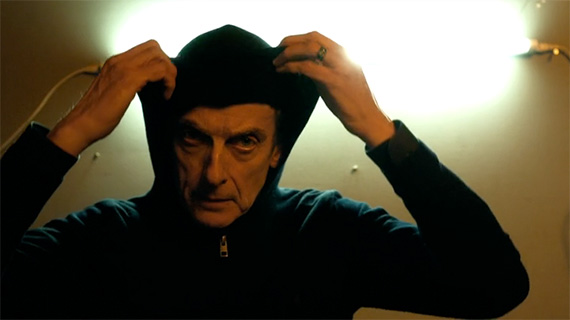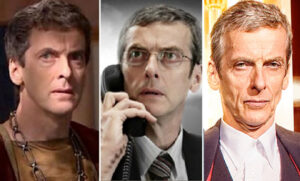The Secret of the Twelfth Doctor
Guest contributor Connor Farley shares an intriguing theory on Twelve.

Not everything is so obvious at face value, and often it is never more apparent than in Doctor Who, which has often revelled in secrecy and hidden possibilities with every regeneration of the Doctor gone by. Often it is things that the writers of the show, and particularly the show runner themselves who don’t want to tell the fans too quickly. That is where speculation comes into play. Speculation is a tool that defines fandoms. So, to play up the tool of speculative thinking, I’m going to share what I think one of the secrets of the latest regeneration of the Doctor are.
We are currently one series into Capaldi’s tenure as the Twelfth Doctor, having first debuted in the Series 8 of Doctor Who. Over the course of thirteen episodes (including Last Christmas), we have begun to become more familiar with who this new Doctor is. Grumpy, irascible, often cantankerous and uncaring to those who don’t deserve it. However, we do not know everything about him, and I am sure there is more to come. Something much, much darker…
Often when the Twelfth Doctor has been mentioned in dialogue online and in conversation. People have usually pointed out the face he has shared with two other characters in the Whoniverse. Those characters being Lobus Caecilius from the 2008 episode The Fires of Pompeii, and John Frobisher from Torchwood: Children of Earth.
 Now, (and here are my speculative gears beginning to creak into action) cast your minds back to The Day of the Doctor. At the end of the special, shortly after the three Doctors (Smith, Tennant and Hurt) froze Gallifrey and placed it in a pocket universe. A familiar face appeared in the gallery to talk to Smith’s incarnation of the Doctor. It was Tom Baker as the gallery’s Curator. During the conversation with the Eleventh Doctor, the Curator mentioned that the Doctor might find himself revisiting a few old faces, but only the old favourites. What if, the Curator didn’t just mean he would visit past incarnations of himself, but also people who have influenced the Doctor in a big way in the past? Caecilius in The Fires of Pompeii heavily influenced the Tenth Doctor. In fact, so much so that when Pompeii fell, the Doctor went against the laws of the time (Pompeii being a fixed point in time) and saved Caecilius and his family. Even when he was not meant to survive.
Now, (and here are my speculative gears beginning to creak into action) cast your minds back to The Day of the Doctor. At the end of the special, shortly after the three Doctors (Smith, Tennant and Hurt) froze Gallifrey and placed it in a pocket universe. A familiar face appeared in the gallery to talk to Smith’s incarnation of the Doctor. It was Tom Baker as the gallery’s Curator. During the conversation with the Eleventh Doctor, the Curator mentioned that the Doctor might find himself revisiting a few old faces, but only the old favourites. What if, the Curator didn’t just mean he would visit past incarnations of himself, but also people who have influenced the Doctor in a big way in the past? Caecilius in The Fires of Pompeii heavily influenced the Tenth Doctor. In fact, so much so that when Pompeii fell, the Doctor went against the laws of the time (Pompeii being a fixed point in time) and saved Caecilius and his family. Even when he was not meant to survive.
However, what if what the Curator said in The Day of the Doctor was a hint of what is to come in what would be Matt Smith’s final regeneration? The Twelfth Doctor was going to be someone, or at least someone’s face from his past, someone particularly notable?
 That aside, then two other pieces of speculation come into play. As the Doctor tampered with a fixed moment in time in the form of Pompeii and broke one of the laws of time, could Capaldi’s Doctor almost be a punishment from the Time Lords themselves? Something to remind the Doctor of the damage he caused to time itself by saving Caecilius and his family. There is one distinct similarity between Pompeii and also the fall of Gallifrey during the Time War. In the event of Vesuvius erupting and the Time War coming to an end with the Doctor and the Moment, there were no survivors from either. Everyone was killed. In Doctor Who mythology, both of them are, as mentioned technically fixed moments in time and shouldn’t be changed. Yet, the Doctor changed both events significantly. Again, something that goes against the laws of time set down by the Time Lords themselves.
That aside, then two other pieces of speculation come into play. As the Doctor tampered with a fixed moment in time in the form of Pompeii and broke one of the laws of time, could Capaldi’s Doctor almost be a punishment from the Time Lords themselves? Something to remind the Doctor of the damage he caused to time itself by saving Caecilius and his family. There is one distinct similarity between Pompeii and also the fall of Gallifrey during the Time War. In the event of Vesuvius erupting and the Time War coming to an end with the Doctor and the Moment, there were no survivors from either. Everyone was killed. In Doctor Who mythology, both of them are, as mentioned technically fixed moments in time and shouldn’t be changed. Yet, the Doctor changed both events significantly. Again, something that goes against the laws of time set down by the Time Lords themselves.
In The Time of the Doctor, the Time Lords awarded the Doctor a new cycle of regenerations. Knowing they had been saved from almost total extinction by the three Doctors, did the Time Lords not only want to thank the Doctor, but again punish him for yet again breaking the laws of time? Therefore, controlling the Eleventh Doctor’s regeneration into a past face that will remind him of those actions.
This may then in turn explain why the new Doctor is significantly darker than before. He is aware that it is a punishment and is; therefore, unsure whether what he did was right for the common good. Something, which could then be addressed with the ‘Am I good man?’ story arc in the last series. He was so unsure of what he had done and his past actions that he began to question himself?








